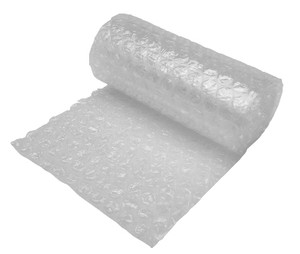
-
 £82.62 (Inc. VAT)£68.85 (Ex. VAT)
£82.62 (Inc. VAT)£68.85 (Ex. VAT)
Large Bubble Wrap
High-impact cushioning for bulkier, heavier or more delicate shipments. Large bubble wrap fills voids quickly and absorbs shocks better than small bubbles, helping reduce transit damage.
Impact Absorption Void Fill Rolls & Sheets Lightweight Protection
Also see: Small Bubble Wrap · Biodegradable Bubble Wrap · Bubble Pouches · Anti-Static Bubble Pouches · Pair with Cardboard Boxes and Packing Tape.
What is large bubble wrap?
Bubble film with a larger cell profile (commonly around ~20 mm diameter, ~7 mm height). The bigger air pockets absorb more energy per layer and bridge larger gaps inside outer cartons.
When to choose large bubbles
Choose for heavier items, bigger voids and rougher routes. It’s ideal as a primary void fill, corner/edge buffer and outer wrap for fragile or dense goods. For tight surface conformity, switch to small bubble.
Typical uses
Appliances & hardware: create corner bumpers and protect protruding parts; top-up with cardboard sheets as stiffeners.
Fragile homeware: glass, ceramics, framed items. Wrap with large bubbles, finish with a snug double wall box.
Multi-item kits: pad between items to prevent collision.
Pallet loads: layer between products and use as edge cushioning before stretch wrapping.
Benefits & features
Superior shock absorption
Larger cells disperse forces from drops, knocks and compression in hubs.
Fast void filling
Bridge bigger gaps with fewer layers to speed packing and reduce movement.
Versatile formats
Use as rolls, pre-cut sheets or combine with pouches for small parts.
Choosing the right option
| Option | Best for | Pros | Consider |
|---|---|---|---|
| Large Bubble (roll) | Big voids, heavier goods | High impact absorption, fast packing | Bulkier than small bubbles; not as conforming |
| Small Bubble | Surface protection, tight wrap | Great conformity and finish | May need more layers for heavy items |
| Biodegradable | Eco-focused brands | Environmental messaging | Follow storage/disposal guidance |
| Bubble Pouches | Small parts, fast throughput | Consistent padding, easy loading | Fixed sizes; less flexible than sheets |
| Anti-Static Pouches | ESD-sensitive electronics | Dissipative materials reduce static | Use as part of a full ESD process |
Right-size the outer with Cardboard Boxes and seal using Packing Tape (H-tape pattern) to lock layers in place.
Packing tips
Start with corners/edges: build cushioning at impact points, then wrap the body.
Layering strategy: one perimeter layer for scuffing, add more where weight/fragility demands. Use cardboard sheets to create rigid faces.
Stability: eliminate internal movement with void fill; shake-test boxes lightly before sealing.
Combine with
Double Wall Boxes for heavier items and stacking.
Packing Tape for secure closures; consider reinforced tape for heavy cartons.
Bubble Pouches inside kits to separate small parts.
Large Bubble Wrap – FAQs
Use large bubbles for heavier products, larger gaps in cartons, or when you need greater impact absorption with fewer layers. For tight-fit surface protection, choose small bubbles.
Typically 1–2 layers for general cushioning; add more at corners/edges for fragile or dense items. Always perform a shake test to confirm stability.
Many LDPE films are recyclable via soft-plastic collection points. If sustainability is a priority, consider our biodegradable bubble wrap.
Yes—large cells bridge gaps efficiently. For very large voids, combine with crumpled paper or foam corners and secure with packing tape.
Use double wall boxes for heavy or fragile loads; single wall can suit lighter items. Ensure a snug fit to minimise internal movement.
Yes—wrap individual items, pad contact points, and isolate pieces so they can’t collide. Add stiffeners to protect faces.